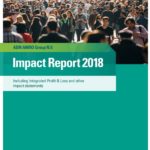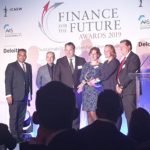In the Netherlands several companies have done experiences in the field of sustainable enterpreneurship. DHV, a Dutch based consultancy, made the Sustainability ScoreCard, a management instrument for sustainability.
The following article gives an overview of some exeperiences with this tool.
In 1998, ABN Amro Bank was unpleasantly surprised when it became the target for criticism from the community. Environmental organizations called on the bank to account for its financial involvement in the Freeport mine in Irian Jaya. The organizations demanded that ABM Amro take action to counter the pollution and other negative impacts of the huge copper and gold mine. Two years later, the bank came under attack again. A report from Greenpeace and Environmental Defense revealed that ABN Amro together with Rabobank and Fortis were, through their loans and services, indirectly involved in the burning off and destruction of tropical forest in Indonesia to make way for huge oil-palm plantations.
Instead of digging in its heels, ABN Amro relatively quickly drafted a set of social and environmental guidelines for the financing of activities involving a high environmental risk. In hindsight, the environmental movement was right, Mr. H. Mulder, head of the risk management department at ABN Amro, was recently quoted as saying in the Dutch daily the Volkskrant. Fortis and Rabobank, for their part, began imposing binding environmental requirements on oil-palm plantation operators to whom they lend money.
Mr. Mulder also states in the above article that green finance is going to grow rapidly. Companies that neglect environmental issues will suffer the financial consequences. They will lose customers and shareholders, and their employees will start looking around for another job nowadays, people want to feel good about the company they work for.
Society is generally calling for more openness and transparency from businesses, and these must be prepared to be held publicly accountable for their actions. In response some companies have decided to implement the concept of sustainable business, which is founded on the three familiar pillars: ecological quality (Planet), well-being (People) and economic prosperity (Profit). In short, business must forge a link between financial returns and ecological and social achievements. This means that they must always have their feelers out to identify any threats and opportunities. As issues arise, they must be ready to respond and account for themselves, answering such questions as: What’s the company’s position on genetically modified organisms? What’s its policy with regard to immigrant or foreign workers? What are its views on animal welfare? Does it use child labor in any part of its production chain?
Positioning
The motivation behind the pursuit of a sustainable business strategy can be varied. For world brands, such as Coca Cola, Ikea and Nike, there is really no choice. The spotlights are so strongly focused on them that one slip-up on their part can have serious consequences: brand image damaged and market share lost. In the case of other businesses such a strategy can result in a competitive advantage. According to Jacqueline Cramer, Professor of Environmental Management at Erasmus University of Rotterdam and Crown-appointed member of the Dutch Social and Economic Council, sustainable business is what differentiates companies. She notes that nowadays, any business can supply good quality at a competitive price. But a business position cannot be founded on this alone. Being a sustainable business, however, can set the company apart. Sometimes the initiative is taken in response to sector-specific events, such as mad-cow disease (BSE). Ms. Cramer adds: By responding with a new policy a business gives an indication that it has ambitions that stand out above the crowd.
Jacqueline Cramer is also program manager of the program entitled "From financial to sustainable returns", conducted by the Dutch National Initiative for Sustainable Development (NIDO). The program’s aim is to initiate and support transformation processes in the business world aimed at furthering sustainable business. Twenty-one companies from various sectors are participating. The list includes Peeze, Ouwehands Zoo, Interface, DSM, Nuon, Rabobank, Stora Enso Berghuizer Paper Manufacturers, KLM, Ordina, Ytong, Uniqema, Dumeco and AVR, and encompasses chemical processes, information technology, building, paper, banking, waste processing, catering and zoos.
Catalyst
Before a sustainable business strategy can be embarked on, a clear picture is needed of the company’s current status and performance. This requires taking a so-called "reference measurement". The NIDO project operates with a Sustainability ScoreCard (SSC), which was developed by DHV in collaboration with the Nyenrode University and Good Company. Ms. Cramer is happy with the SSC. DHV was the first to come up with a useful list of questions which had already been put to the test. Nevertheless, we didn’t want to settle for the first one to come along, and therefore asked two other consultancies to present their ideas. DHV’s was still the best.
The SSC contains all existing documents and guidelines in the area of sustainable business. In addition, it includes opinions and expectations from lobby organizations such as Greenpeace and Amnesty International. The general list of questions will in the future need to be aimed at specific sectors or companies, according to Ms. Cramer, but in its present form it is already useful for getting businesses started on the sustainable business path. The reference measurement acted as a catalyst for businesses,she says. In the case of Ytong and Dumeco, the SSC resulted in a broader base for sustainable business. The gathering and listing of information for the scorecard was often carried out by the environmental coordinator. At first, staff were surprised when the coordinator started asking questions about personnel policy. But this approach did allow for effective communication about the three pillars of sustainable business. The gathering of information therefore already led to greater insight into the meaning of sustainable business.
Setting boundaries
The outcome of the SSC helps a business set boundaries, says Rob van Tilburg, who is closely involved with the SSC on behalf of DHV. To what extent is a business accountable for its actions? For example, one of the participating companies happens to burn abattoir waste that has come from bio-industry. Can it be held accountable for this by other parties? After some discussion it was decided that in this case the company was not responsible because it processes the material as waste rather than using it as a product. Another company found that it was conducting business with countries that infringe human rights. Since it had no policy in place for this, it is now busy formulating one. The effect of the SSC is that businesses have started to become aware of how they are affecting society and are now compelled to think in a more structured way about their responsibilities as far as these effects are concerned. Mr. Van Tilburg notes that there were very few drop-outs. Some companies, such as the Rabobank, are going to create a sustainability report. Following up on the NIDO project, DSM is likewise working on aform of reporting about sustainable business. Another example is Stora Enso Berghuizer Paper Factory where more environment-friendly paper is starting to be produced.
Ultimately the aim is that a business change its attitude both in an inward as well as an outward direction, Ms. Cramer explains. A sustainable approach to business must become lodged in the very genes of a business.
DHV and sustainable business
DHV’s sustainable business advisory group has grown considerably in recent years, and is the market leader in this area of expertise. In addition to the application of the Sustainability ScoreCard (SSC), the advisory group provides guidance at management level to large Dutch companies for the development and implementation of policy on social issues, environment, human rights, animal welfare, etc.
Nutreco, CSM, Achmea, Avebe and Stork are some of the client companies. Important advisory services include developing policy, viewpoints and codes of conduct as well as providing support with sustainability reports. The group operates on the cutting edge of content, communication and process issues.
For more information:
Rob van Tilburg:
e-mail: rob.vantilburg@dhv.nl
phone: +31 33 4682744



